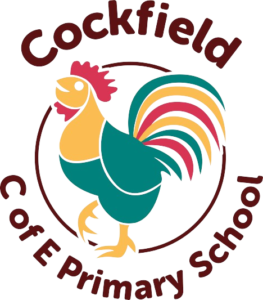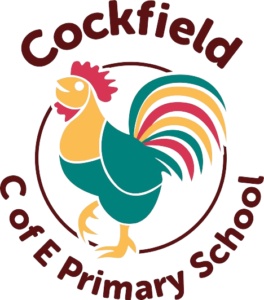Forest School
At Cockfield CEVC Primary School through weekly Forest School sessions we aim to instil a love of the great outdoors. Hands on experiences will develop self-esteem, confidence and independent learning. Cockfield School envisage that Forest School will not be about adults telling children what to do and how to do it, but how to discover things for themselves. The use of the woodland setting, the various real tools and the natural resources will bring learning to life, creating an understanding of the balance of nature and the finite resources around us.
We aim to deliver child-led learning; carefully observing the interests and needs of each unique group of children in the early session stages, then letting the children lead the sessions through their own interests as the week’s progress. Adults will be there to scaffold and extend the endless learning experiences that will link in with the National Curriculum and EYFS. We want the children to take informed, self-calculated risks and choices to ensure their whole groups safety and enjoyment, whilst working as a team to solve problems, fostering communication and negotiation skills.
What is Forest School?
“Forest School is an inspirational process, that offers ALL learners regular opportunities to achieve and develop confidence and self-esteem through hands-on learning experiences in a woodland or natural environment with trees.”
Forest School Association (2013)
The key features of Forest School are as follows:
- The use of a woodland setting that is framed by strict safety routines and established boundaries that allows the flexibility and freedom for child-initiated learning.
- Allows children, with adult supervision, to undertake tasks and play opportunities that challenge them but do not put them at undue risk of harm.
- Learning can be linked to the National Curriculum and Early Years Foundation Stage objectives whilst setting those objectives in a different context, not focused just on the natural environment.
- The freedom to explore using multiple senses is fundamental for encouraging creative, diverse and imaginative play.
As the children feel comfortable in the woods, the sessions become increasingly child-led and as such, Forest School is not about a set programme of planned activities. Children are given encouragement to direct their own learning. One class may spend two weeks looking for insects and move onto identification and habitat creation, whereas another group may not show this interest but may be intrigued by the mechanics of building a waterproof shelter large enough to house 6 children in, constructed with only natural materials. The role of supporting adults is therefore to stimulate, scaffold and extend the child’s learning and observe them in play, to prepare for future sessions.



A Typical Forest School Session
The learning opportunities at Forest School are endless, but a typical session may involve the following:
- Dress appropriately for an outdoor session.
- Meet at the Fire Circle – which is the central meeting place whilst at Forest School.
- Health and Safety discussion – The Forest School Practitioner will share any specific hazards from the Daily Risk Assessment; practise certain procedures e.g returning to the Fire Circle (usually by playing games), setting up a tool area, identifying where would be a good digging and mud play area.
- Idea ‘seeds’ – The Forest School Practitioner introduces the session using a story, game or activity, this will be based on observations from previous sessions and then linked to their class curriculum wherever appropriate.
- Free Choice – Children choose which activities they would like to engage in, adults may model certain ideas and skills to support learning e.g. how to whittle a hazel wand with tools whilst other children work independently. Common Forest School activities include, but are not exclusive to:
- Lighting a campfire.
- Shelter building.
- Preparing and then Cooking food on an open fire. Discovering wildlife and their habitats.
- Bush craft skills. Woodland and natural art.
- Imaginative play.
- Circle time – time at the end of a session around the fire circle to reflect and discuss future sessions whilst sharing a hot chocolate, or hot squash which is a firm and surprising favourite.
- Closing Ceremony – a song or story to signify the end of the session. The fire is put out (if ignited) and the children assist with tidying up and putting the woodlands back to how it was before they arrived.
Our Forest Schools Experience Galleries are HERE

